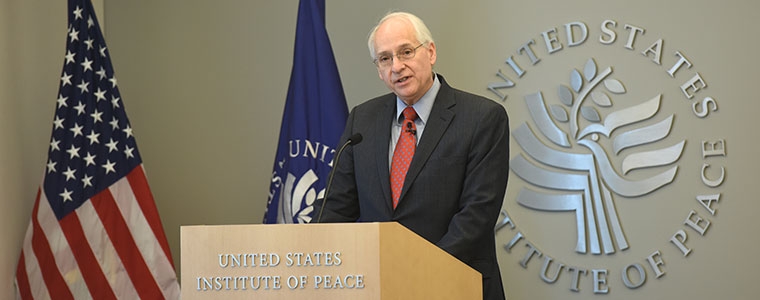U.S. envoy says Sudan armed groups should put their people first

January 18, 2017 (WASHINGTON) – The outgoing U.S. Envoy to Sudan and South Sudan Donald Both Wednesday criticized the refusal of the Sudan People’s Liberation Movement – North (SPLM-N) for a humanitarian proposal saying they should put their people first not their political ambitions.
Since last November the U.S. envoy filled a proposal providing that USAID would transport humanitarian medical assistance to civilians in the rebel held areas after it inspection by the Sudanese authorities. Khartoum accepted it but the SPLM-N stuck to its initial demand to transport 20% of the humanitarian aid through the Ethiopian Asosa town on the border with the Sudan.
This point is the last contentious point preventing the signing of humanitarian and cessation of hostilities agreements between the government and the rebel group, in a peace process mediated by the African Union High Level Implementation Panel (AUHIP) and facilitated mainly by the U.S. and Germany.
“I must say we need to be careful not to hold them in unquestioned high esteem. It is important to be clear-eyed about whom we are dealing with,” Booth said, in a speech at the U.S. Institute of Peace about his action during the past three years.
“I have found that some of the leaders of the Sudanese opposition, especially those with guns, are more than willing to ignore the interests and well-being of ordinary civilians, in favour of their own political ambitions,” Booth added.
In line with a Roadmap Agreement brokered by the AUHIP, the government and rebel groups in the Two Areas and Darfur should reach first a humanitarian truce before to move for a second phase to discuss other confidence building measures and hold an inclusive political process to discuss constitutional reforms in order to restore democracy in Sudan.
The Chief Mediator Thabo Mbeki worked to have armed groups in Darfur and the SPLM-N as well as opposition groups in this forum to achieve what he calls “holistic approach” to end the Sudanese crisis. Backed by the German government first and then by U.S. administration he convinced Khartoum to accept this comprehensive process.
“It seems to me that just as there are hardliners within the Sudanese government who hold on to false notions that military victory can be achieved, so too there are leaders of the armed groups who believe they are right to fight on no matter what the cost to their people, until they get what they want politically,” Booth said.
Both last Monday together with other Troika envoys (Britain and Norway) and the newly appointed French envoy for Sudan met with the SPLM-N in Paris to convince them to accept the humanitarian proposal, adding that they should not miss this golden opportunity to reach civilians in all the war affected areas in the two areas. Khartoum will not dare to obstruct during the upcoming six month because this means the resumption of sanctions, they underlined.
“So even though we hold the government to its commitments to peace, we must also demand that the opposition set aside personal political ambitions and put their people first,” he stressed.
The SPLM-N says they did a lot of concession on the humanitarian file to ensure the delivery of aid to the civilians in the conflict affected areas, and points to Khartoum’s intransigence and refusal to accept the 20%.
Khartoum accuses the rebel groups of planning to use the humanitarian corridor through Ethiopia to bring arms and ammunition to their fighters. But the SPLM-N says they accept that the relief materials be inspected by Sudanese authorities before.
The U.S. envoy said during the past year he wanted to go beyond the mistrust and accusations of bad faith in the relations between Washington and Khartoum, adding that this engagement has really started in February 2015 when the invited the then Presidential Assistant Ibrahim Ghandour.
He also said the new administration of President Donald Trump is fully briefed about the Sudanese file, including the recent developments.
Booth is the first American diplomat who has openly criticized Sudanese armed groups, accusing them of obstructing peace in Sudan.
Recently he slamed Abdel-Wahid al-Nur for his refusal to join the peace process saying “His refusal to negotiate has been a perennial problem for international efforts to end the conflict in Sudan, but it has become especially damaging as other parties to the conflict begin moving toward peace”.
(ST)
